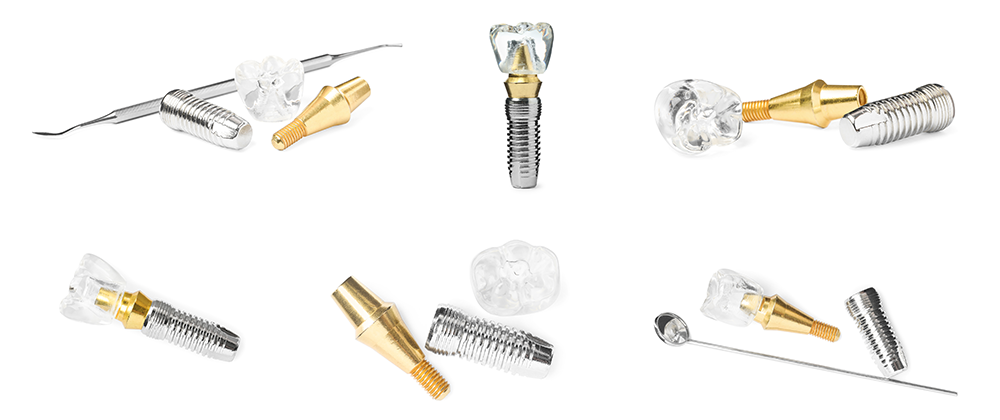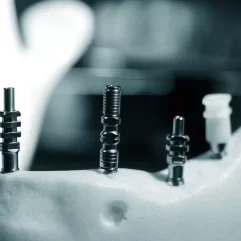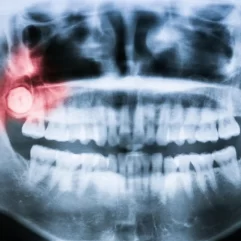Exploring the Different Dental Implant Types
A Comprehensive Guide to Choosing the Right Dental Implant for You
You probably have many questions if you are looking for a dentist who can provide quality, affordable dental implants. For example, you might wonder how much it will cost, what an implant is, what dental implant types are available, and how getting a dental implant works. This blog post was written to help you understand the different dental implant types available and, more importantly, to help you choose the best implant.
The Implantology field is extensive and complicated. Procedures and new materials continue to evolve, and it would be great if you could understand some basic concepts to make the best decision for your dental needs. We feel it’s important to understand some basic things about your options for dental implant types, for example, the various types of material used, what the procedure involves (how invasive it is), and the pros/cons of different dental implant types, so if you have a consult with your dentist, you have some basic understanding of various dental implant types.
Dental implants are a popular and effective solution for replacing missing teeth. They are a permanent and durable option that closely mimics the look and feel of natural teeth. Several different dental implant types are available, each with advantages and considerations. In this blog post, we will explore the various dental implant types to help you decide which option may be best for you.
Endosteal Implants
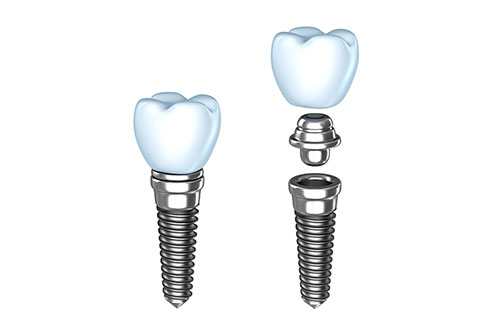
Endosteal implants.
Endosteal implants are considered the gold standard in dental implant technology and are the most commonly used type today. They are surgically placed directly into the jawbone, providing a stable and strong foundation for replacement teeth. Placement of endosteal implants involves making an incision in the gums to access the jawbone, where the implant is then securely inserted. They can support single crowns, bridges, or dentures, depending on the patient’s needs.
One key benefit of endosteal implants is their ability to support various dental restorations, including single crowns, bridges, or dentures. This versatility makes them a popular choice for patients with different restoration needs. Whether a patient is missing one or several teeth, endosteal implants can be customized to accommodate their specific situation.
Endosteal implants are typically made of titanium, a biocompatible material well tolerated by the body. Titanium is known for its strength, durability, and ability to fuse with the surrounding bone in osseointegration. This fusion creates a solid bond between the implant and the jawbone, providing a stable and long-lasting foundation for the replacement tooth or teeth.
In addition to their durability and biocompatibility, endosteal implants offer several other advantages. They help preserve the bone structure of the jaw, preventing further bone loss and maintaining the integrity of the facial structure. Endosteal implants also provide a natural look and feel, allowing patients to bite, chew, and speak comfortably without worrying about their teeth shifting or moving.
Overall, endosteal implants are a reliable and effective solution for replacing missing teeth and restoring oral function. With their strong foundation, versatility in supporting different dental restorations, and biocompatible material, endosteal implants offer patients a long-term solution for improving their oral health and quality of life. If you are considering dental implants, consult a qualified dental provider to determine if endosteal implants are the right choice.
To learn more about Endosteal implants, please read our blog Endosteal Implants: Cost, Benefits, and Risks.
Subperiosteal Implants
Subperiosteal implants are a specialized type of dental implant that is an alternative option for patients who do not have enough healthy jawbone for traditional implant placement. Subperiosteal implants are
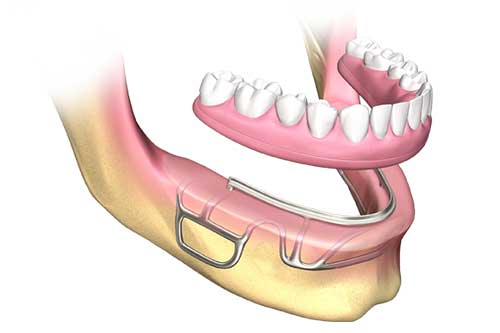
Subperiosteal Implant.
Subperiosteal implants are often recommended for patients who have experienced significant bone loss due to tooth loss, periodontal disease, or other factors. They offer a more streamlined and efficient treatment option for individuals with compromised jawbone structure by avoiding the need for bone grafting procedures.
Unlike endosteal implants, which are placed directly into the jawbone, subperiosteal implants are positioned on top of the jawbone, beneath the gum line. This unique design allows patients with inadequate bone density to still benefit from the advantages of dental implants.
The placement of subperiosteal implants begins with creating a custom-made metal framework designed to fit the specific shape and contours of the jawbone. This framework is then surgically placed on top of the jawbone, allowing the gums to heal and cover the implant. The metal framework features attached posts extending through the gums, providing support for the replacement teeth attached to the implant.
One key advantage of subperiosteal implants is their ability to provide a stable and secure foundation for replacement teeth in cases where traditional implants may not be feasible. The custom-made design ensures a proper fit that conforms to the patient’s jawbone’s unique anatomy, enhancing the implant’s overall stability and functionality.
When comparing dental implant types, while subperiosteal implants are less common than endosteal implants, they can be a valuable solution for patients seeking an alternative to traditional implant placement. With their custom-made design, ability to accommodate limited bone density and support for various types of dental restorations, subperiosteal implants provide a viable option for restoring oral function and aesthetics in patients with unique anatomical considerations. Discuss the potential benefits of subperiosteal implants with your dental provider if you are considering dental implants and have concerns about your jawbone density.
Transosteal Implants
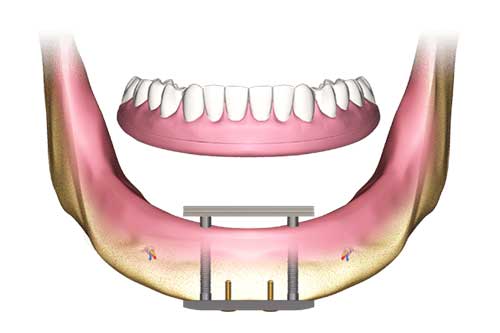
Transosteal Implant.
Similar to Subperiosteal implants, a Transosteal Implant is the least common type of dental implant. It is inserted through the jawbone and secured with a metal plate on the underside of the jaw. This type of implant is typically used for patients with severe bone resorption who cannot support other types of implants. The procedure is more invasive, involving drilling through the jawbone to bolt the implant in place.
A transosteal implant is a type of dental implant placed directly through the jawbone and protruding through the gums to support a prosthetic tooth or set of teeth. This type of implant is often used when a patient has minimal bone structure in their jaw to support traditional dental implants.
To place a transosteal implant, a surgical procedure is performed to drill a hole through the jawbone and secure a metal post or plate that extends through the gums. The prosthetic tooth or teeth are attached to the post or plate, providing a secure and stable foundation for chewing and speaking.
Transosteal implants are less common than traditional dental implants due to the procedure’s invasiveness and potential complications. However, they may be a good option for patients with severe bone loss in their jaws and are not candidates for other types of dental implants.
All-on-4 Implants
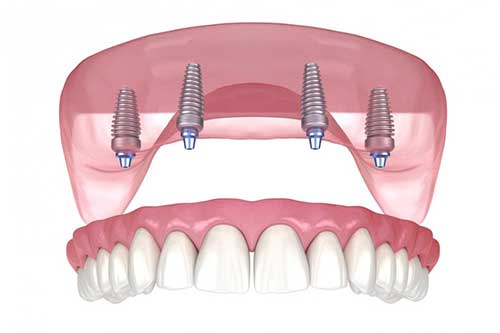
All-on-4 Implants.
All-on-4 implants are one of the most popular dental implant types. This technique allows just four implants to support an entire arch of replacement teeth. It is ideal for patients who are missing a whole arch of teeth and want a more cost-effective and efficient solution than individual implants.
All-on-4 permanent dentures, or full-arch fixed implant bridges, are dental restorations designed to replace an entire arch of missing teeth using only four dental implants. This innovative solution provides a stable and permanent alternative to traditional removable dentures.
The All-on-4 procedure involves strategically placing four dental implants in the jawbone to support a custom-made dental bridge that spans the entire arch of missing teeth. The implants are strategically angled to maximize the use of available bone and provide strong support for the bridge.
Key benefits of All-on-4 permanent dentures include:
- Improved stability: The dental implants securely anchor the bridge, eliminating the need for messy adhesives and preventing shifting or slipping.
- Enhanced chewing and speaking ability: The fixed nature of the dentures allows for more natural chewing and speaking functions than traditional dentures.
- Preservation of bone density: Dental implants stimulate the jawbone, helping to prevent bone loss and maintain facial structure over time.
- Aesthetically pleasing results: The custom-made bridge is designed to look and feel like natural teeth, enhancing the smile’s appearance.
Overall, the All-on-4 permanent procedure offers a long-lasting and reliable solution for individuals missing an entire arch of teeth who are looking for a more comfortable and functional alternative to traditional dentures.
Mini Implants
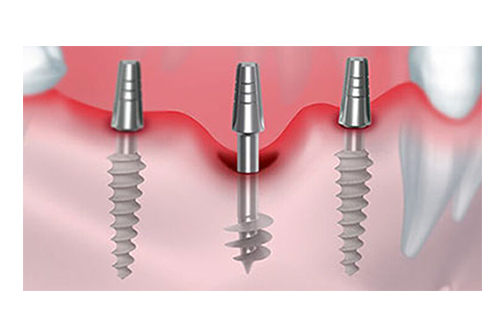
Mini Implants.
Like Endosteal implants, Mini dental implants are smaller in diameter than traditional implants. They are often used in patients with limited bone density or who are not candidates for standard implant placement. They are less invasive and can support small bridges or dentures. Mini implants are a more affordable option for patients who may not be able to undergo traditional implant surgery.
Mini dental implants are a smaller, more streamlined alternative to traditional dental implants. They are typically used to anchor dental prosthetics, such as dentures or bridges, in place. Since mini implants are generally less invasive than traditional implants, as they require less bone structure for placement and do not usually require bone grafting procedures, they are a popular option for patients who may not be good candidates for traditional implants due to insufficient bone density or other health issues.
Despite their smaller size, mini dental implants are still durable and long-lasting, providing a stable foundation for prosthetic teeth. They can improve dental restorations’ fit, comfort, and functionality, giving patients a natural-looking smile and better oral function.
Zygomatic Implants
Of all the implant dental types, Zygomatic implants are the most invasive and specialized. They are anchored into the zygomatic bone, or cheekbone, instead of the jawbone. They are used in patients with severe bone loss in the upper jaw who are not candidates for traditional implant placement. Zygomatic implants provide a stable foundation for replacement teeth and can often be placed in a single surgical procedure. In conclusion, several different types of dental implants are available to meet each patient’s unique needs.
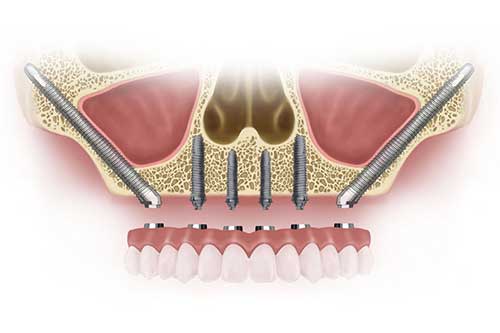
Zygomatic Implants.
Zygomatic implants are used in cases where traditional dental implant types may not be an option due to insufficient bone density in the jaw. These implants are anchored into the zygomatic bone in the cheek area of the face. By using the zygomatic bone as a stable foundation, patients who would otherwise not be candidates for traditional implants can still benefit from dental implants’ functional and aesthetic benefits.
Placing Zygomatic implants is more complex than placing conventional dental implants, requiring careful planning and precision to ensure a successful outcome. However, for patients with severe bone loss or other challenges, zygomatic implants can be a life-changing solution for restoring their smile and oral health.
Critical Considerations for a Successful Dental Implant Procedure
Several important factors must be considered when considering dental implants to ensure a successful and long-lasting outcome.
- Bone Density and Quality: Adequate bone density and quality are essential for the successful placement of dental implants. The jawbone must be strong enough to support the implant and withstand the chewing forces. If bone loss has occurred due to missing teeth or other factors, bone grafting may be necessary to build up the bone before implant placement.
- Overall Oral Health: Good oral hygiene and oral health are crucial for the success of dental implants. Gum disease and other oral health issues can compromise the stability of the implants and increase the risk of implant failure. Addressing any dental problems, such as gum disease or cavities, before implant surgery is essential.
- Medical History: Certain medical conditions, such as diabetes, autoimmune disorders, or a history of radiation therapy, may impact the success of dental implants. Discussing your medical history with your dentist or oral surgeon before implant surgery is essential to determine whether you are a suitable candidate.
- Lifestyle and Habits: Smoking and excessive alcohol consumption can have a negative impact on the success of dental implants. These habits can slow down the healing process, increase the risk of complications, and impair the integration of the implant with the jawbone. It is advisable to quit smoking and reduce alcohol consumption before and after implant surgery to maximize the chances of success.
- Maintenance and Follow-Up Care: Proper maintenance and regular dental check-ups are essential for the long-term success of dental implants. Good oral hygiene practices, such as brushing and flossing regularly and routine dental cleanings, can help prevent complications and extend the lifespan of the implants. Attending follow-up appointments with your dentist is essential to monitor the implants’ health and ensure they function correctly.
In Conclusion
Dental implants offer a long-lasting and effective solution for restoring missing teeth and improving oral health. Whether you are considering traditional implants, mini implants, or implant-supported dentures, it is crucial to seek the expertise of a qualified dentist or oral surgeon. A trained professional can assess your needs and recommend the best dental implant, ensuring a successful and comfortable restoration. Investing in your oral health and selecting the right dental implant can significantly affect your quality of life and overall well-being.
Factors such as bone density, oral health, medical history, lifestyle habits, and follow-up care must be considered when evaluating various dental implant types. By addressing these considerations and working closely with your dental provider, you can achieve a successful and lasting outcome.
Mayo Clinic, renowned for its expertise in medical research and patient care, is an invaluable resource for future research on dental implant types and dental implant surgery. With a team of experienced dentists and specialized surgeons, Mayo Clinic conducts cutting-edge studies and clinical trials to advance the field of dental implantology.
If you have questions or need additional information, please Contact Us or Request a Quote to send us your dental inquiry, and we’ll get back to you.

